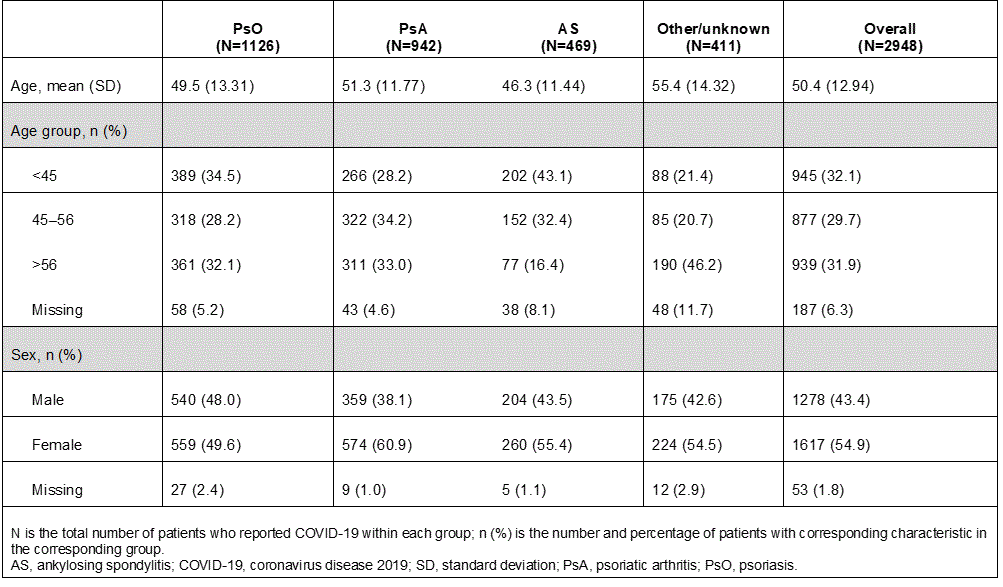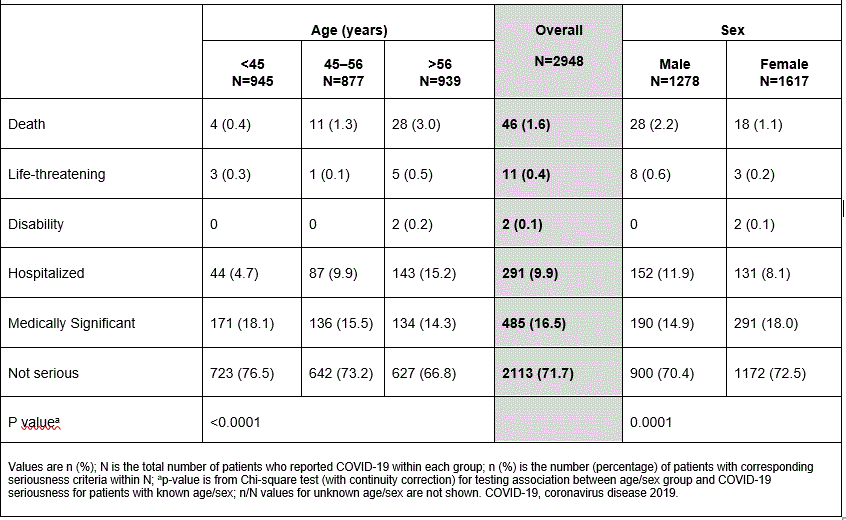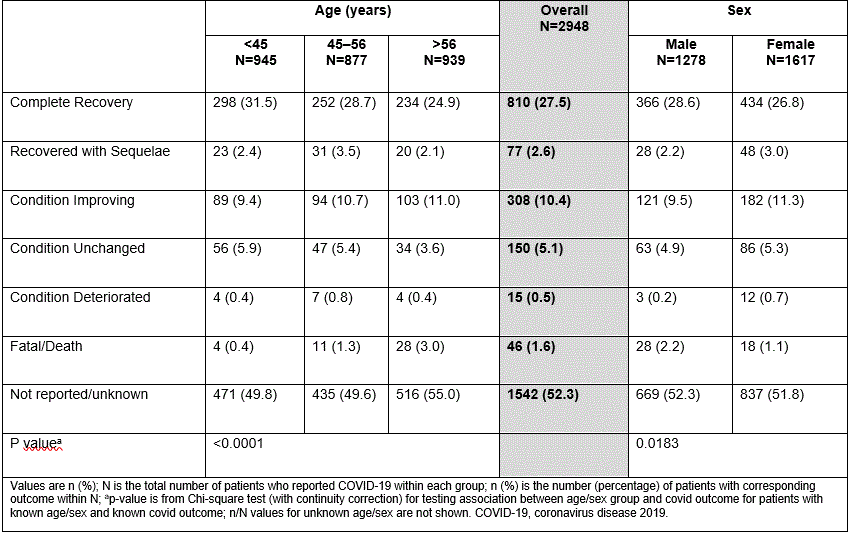Session Information
Session Type: Poster Session D
Session Time: 1:00PM-3:00PM
Background/Purpose: Although patients (pts) with immune-mediated inflammatory diseases who are taking immunosuppressive therapies are not at a significantly greater risk of SARS-CoV-2 (severe acute respiratory syndrome coronavirus 2) infection, the reported risk of severe unfavorable outcome or sequalae varies among studies1,2. As specific data in pts treated with secukinumab are lacking, we analyzed the outcomes of coronavirus disease 2019 (COVID-19) in pts with psoriasis (PsO), psoriatic arthritis (PsA), or ankylosing spondylitis (AS) treated with secukinumab by using the Novartis global safety database.
Methods: The Novartis global safety database was searched for cases reporting COVID-19 in pts receiving secukinumab. Cases reported from clinical trials or post-marketing surveillance between December 2019 and February 2022 were included in the analysis. Potential associations between subgroups (e.g., age, sex, treatment indication) and COVID-19 seriousness or outcomes were examined using Chi-squared testing. P-values were nominal for these exploratory analyses.
Results: As few clinical trials with secukinumab were ongoing, only 8 cases of COVID-19 were reported. All of the cases were hospitalized, and none were suspected to be study drug-related; 7 recovered completely and 1 recovered with sequelae. There were 2948 COVID-19 cases reported from post-marketing surveillance (PsO: N=1126; PsA: N=942; AS: N=469); a higher proportion of pts with AS were younger (43% less than 45 years) compared with pts with PsO or PsA (Table 1). The majority (71.7%) of the cases were not serious. Older age and male sex were associated with COVID-19 seriousness (P< 0.0001 and P=0.0001, respectively; Table 2). Furthermore, pts with AS were less likely to have serious COVID-19 than pts with PsO or PsA (PsO [n=363/1126, 32.2%] vs PsA [n=257/942, 27.3%] vs AS [n=107/469, 22.8%]), potentially due to the younger age in the AS group.
Overall, 27.5% of the reported cases had a complete recovery, 1.6% of the cases were fatal, and for 52.3% the outcome was unknown. Older age and male sex were associated with worse COVID-19 outcome (P< 0.0001 and P=0.0183, respectively; Table 3). Fewer pts with AS had a fatal outcome than pts with PsO or PsA (PsO [n=18/1126, 1.6%] vs PsA [n=14/942, 1.5%] vs AS [n=4/469, 0.9%]), but fewer pts with AS made a complete recovery (PsO [n=390/1126, 34.6%] vs PsA [n=258/942, 27.4%] vs AS [n=114/469, 24.3%]).
Conclusion: This exploratory analysis reports COVID-19 cases in the Novartis global safety database for more than 2 years since the onset of the pandemic. Rates of hospitalization and death from COVID-19 in pts receiving secukinumab were generally in line with reports in immune-mediated inflammatory diseases3 and overall population.4 Consistent with published data, older age and male sex had negative impact on both the seriousness and outcome of COVID-19. Potential associations with underlying disease state warrant further investigation.
References
1. Veenstra J, et al. J Am Acad Derm. 2020;83(6):1696‒1703.
2. Mease PJ, et al. EULAR 2022; abstract OP0247.
3. Haberman R, et al. N Eng J Med. 2020;383:85‒88.
4. WHO. Weekly epidemiological update on COVID-19, 18 May. www.who.int.
To cite this abstract in AMA style:
Deodhar A, Blauvelt A, Mease P, Pournara E, Jagiello P, Bao W, Sharma A. COVID-19 Cases in Patients Treated with Secukinumab: Analysis from the Global Safety Database [abstract]. Arthritis Rheumatol. 2022; 74 (suppl 9). https://acrabstracts.org/abstract/covid-19-cases-in-patients-treated-with-secukinumab-analysis-from-the-global-safety-database/. Accessed .« Back to ACR Convergence 2022
ACR Meeting Abstracts - https://acrabstracts.org/abstract/covid-19-cases-in-patients-treated-with-secukinumab-analysis-from-the-global-safety-database/



